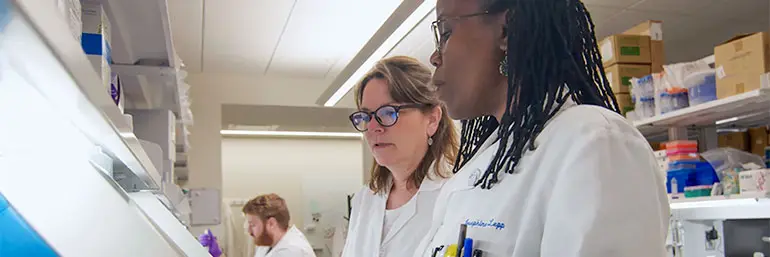The Studies
The aging brain is susceptible to a number of devastating disorders that slowly rob a person of their ability to think, see, hear, or move — functions we often take for granted. With our aging population, prevalence of neurodegenerative disorders will increase over the next few decades.
The Neurodegenerative Disease and Aging Research Focus Area at NEOMED is a collaborative team of researchers who focus on three of the most common age-related neurodegenerations: Alzheimer’s disease (AD), Parkinson’s disease (PD), and glaucoma. Our mission is to discover, develop, and validate new biomarkers and treatments for these diseases.
A patient’s perspective on Parkinson’s research
Sara shares her thoughts on her Parkinson’s diagnosis and the importance of research on neurodegenerative diseases.
VIDEO EXTRA: Sheila Fleming, Ph.D., associate professor of pharmaceutical sciences, reveals the breakthrough her lab seeks as it works to slow the most common age-related neurodegenerations: Alzheimer’s disease, Parkinson’s disease and glaucoma.
The Statistics
10M+
More than 10 million people worldwide are living with Parkinson’s Disease.
#6
Alzheimer’s Disease is the sixth-leading cause of death in the United States, and is the only disease in the top 10 that cannot be prevented, cured or slowed.
3M+
Estimates show that over 3 million Americans have glaucoma but only half of those know they have it.
The successes
- Discovery that bone loss in Alzheimer’s disease may be an early indicator that disease process has begun in the brainstem before it reaches areas that affect learning and memory.
- Evidence that the ketogenic diet may be an effective method for reducing vision loss in glaucoma.
- Discovered that loss of function of the Atp13a2 gene, which is associated with an inherited form of Parkinson’s disease, worsens sensory and motor problems in the disease.
- Discovered that exposure to a commonly used pesticide impaired cellular metabolism.
- Discovered that pre-treatment with dopamine transporter modulating drugs prevented fungicide-mediated damage.
- Discovered that electrical signaling between the eye and brain is lost before neurons degenerate in glaucoma.
- Identified the multiple sclerosis drug fingolimod (Gilenya, Novartis) may restore function to “sick” neurons in glaucoma and other neurodegenerative conditions.
- Discovery that the Wnt/Beta catenin cellular signaling pathway is disrupted both systemically and centrally in early Alzheimer’s disease.

Our research
Recent evidence indicates a number of similarities between different age-related neurodegenerations. We believe that determining the underlying mechanisms of these commonalities in each disease can inform research on the other disorders. Our investigations focus on the following areas:
Drug development, delivery and optimization
As our focus area resides in the College of Pharmacy, it is not surprising that we are heavily involved in drug development and delivery. One of the major hurdles for treating neurodegenerative conditions is getting an effective dose of a drug to the brain.
Dr. Oyewumi uses nanoparticles and other innovative strategies to transport therapeutic compounds to their desired target. Dr. Kasumov’s lab applies mass-spectrometry to identify drug metabolites and drug-induced changes in intermediary metabolism. Dr. Wang’s laboratory focuses on applying pharmaco-omics tools, including pharmacogenomics, proteomics and metabolomics, to improve our understanding of interindividual variability in drug response, with the ultimate goal of optimizing pharmacotherapy for patients.
Neuroinflammation
Inflammatory processes and mitochondrial dysfunction are hallmarks of neurodegenerative conditions. Neuroinflammation and energetic defects are involved in the onset and progression of neurodegeneration in Alzheimer’s disease, Parkinson’s disease, and glaucoma. Our investigators focus on identifying how and when these systems are compromised with the goal of developing novel therapeutic strategies that target disease processes. Researchers in the Sam Crish Lab manipulate the nervous system’s natural repair and support systems to improve neuronal function in neurodegenerative disorders.
Neurotoxicology
Neurotoxins in our environment can influence neurodegeneration, especially in Parkinson’s disease. Our researchers study gene-environment interactions in order to better inform people and policy on environmental risks as well as develop new medications that can treat ongoing neurodegeneration.
Pre-degenerative pathologies
Though neurodegenerative disease is characterized by loss of neurons in certain areas of the nervous system, some of the most exciting research over the past few years indicates that neurons undergo a long period of impaired function in signaling and metabolism before they are irretrievably lost.
Drs. Sam Crish and Sheila Fleming seek to restore function to these “sick” neurons to slow, stop or reverse neurodegeneration and clinical deficits from advancing.
Unique predictors & symptoms of neurodegenerative disease
A very fertile area of research investigates early, seemingly unrelated symptoms of AD and PD as biomarkers and targets for intervention. Our focus area has some of the emerging leaders in this topic. Dr. Christine Crish’s lab investigates early bone loss in Alzheimer’s disease, and Dr. Sheila Fleming’s lab investigates non-motor deficits in Parkinson’s disease. These symptoms can occur years before the onset of each disease’s hallmark symptoms, cognitive dysfunction (Alzheimer’s disease) and motor deficits (Parkinson’s disease).
The Stories
- Read the Story
During a bustling lunch hour at a highfalutin restaurant, two investors talked business. “My broker says it’s a really good buy. What does your broker say?” asks one investor. The […]
- Read the Story
Can exercise slow the progression of neurodegeneration in Parkinson’s disease? Sheila Fleming, Ph.D., associate professor of pharmaceutical sciences, wants to find out. Dr. Fleming, who is also director of the […]
- Read the Story
Sheila Fleming, Ph.D., has been appointed as the director of NEOMED’s Neurodegenerative Diseases and Aging Research Focus Area, effective July 1, 2021. Dr. Fleming, who was recently promoted with tenure […]
CONTACT
Sheila Fleming, Ph.D.
Associate Professor of Pharmaceutical Sciences
Director, Neurodegenerative Disease and Aging Research Focus Area
College of Pharmacy
Phone: 330.325.6568
Email: sfleming1@neomed.edu





